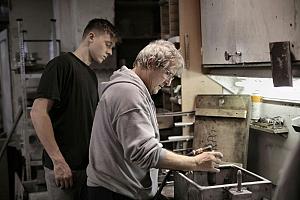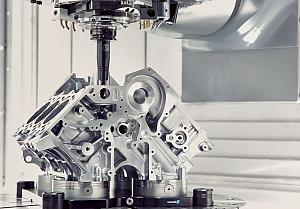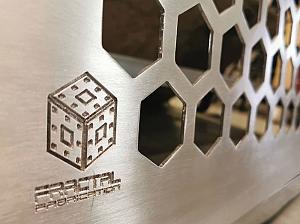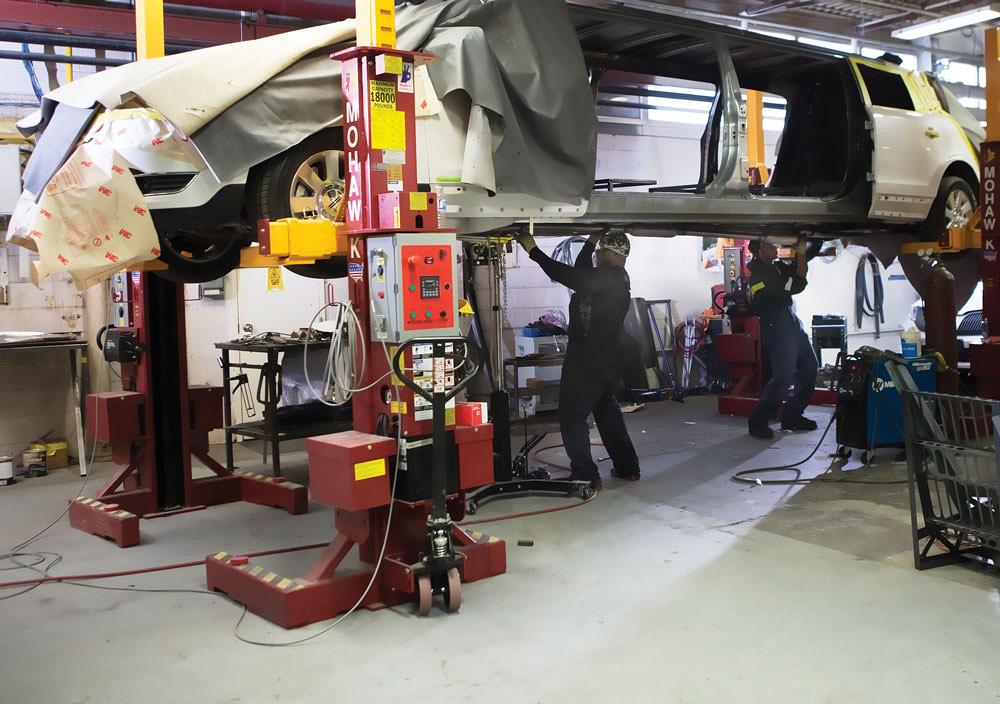- FMA
- The Fabricator
- FABTECH
- Canadian Metalworking
Manufacturing Protection
Ontario fabricator produces armored vehicles, safes for the worldwide market
- By Joe Thompson
- July 7, 2015
- Article
- Made In Canada
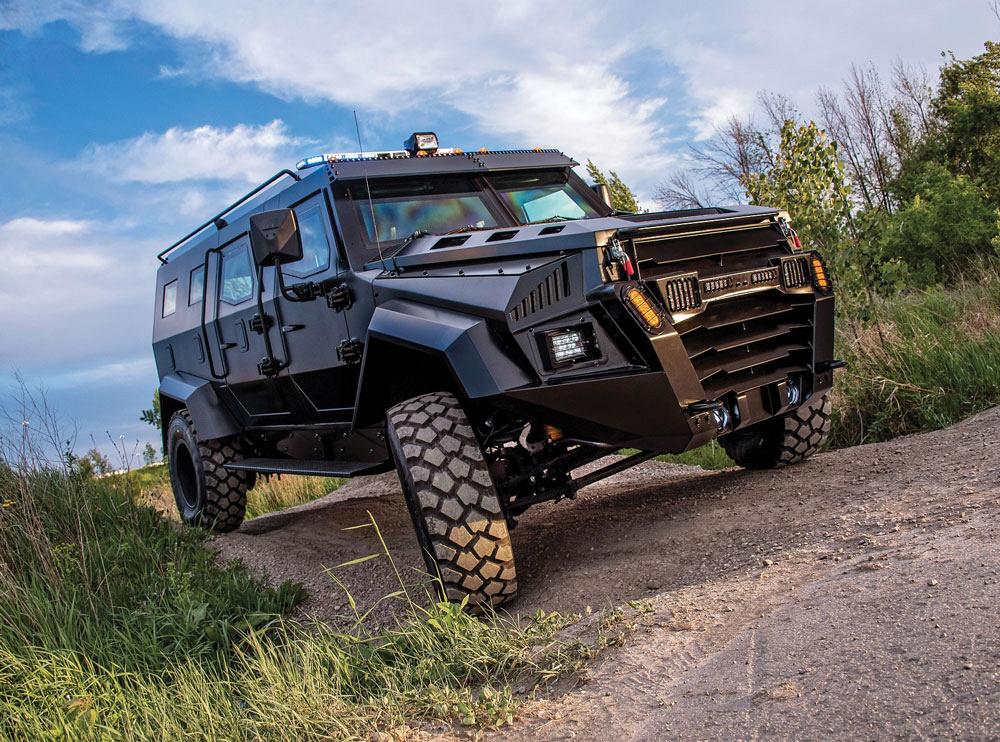
The INKAS® Sentry APC is an example of an armored vehicle produced at the company’s Toronto facility. It has armor protecting its key mechanical components and multilayer ballistic glass. Photo courtesy of INKAS.
Metaline started with the idea of bringing manufacturing home to Canada.
While many companies were still recovering from the recession, Metaline took steps to control production and quality better by opening a facility in Toronto.
Launched toward the end of 2012, Metaline is the fabrication division of the INKAS® Group of Companies, a privately held business specializing in security and protection products and services. The Metaline division fabricates the sheet metal parts necessary for the other divisions of the group, which includes manufacturing armored vehicles and safes.
INKAS’ armored vehicles division, the corporation’s largest and bestknown, has been growing for the past few years. Today the company produces more than 35 vehicles per month, and thanks to its facilities here in Canada and new equipment, the company plans to double its production.
INKAS' armored personnel carriers are used by armed forces the world over, and its up-armored luxury cars often protect high-level politicians and executives.
The entire INKAS operation in Toronto covers about 170,000 sq. ft., with the Metaline fabrication shop occupying nearly half of that space.
INKAS Armored Vehicle Manufacturing, established in 1996, specializes in the design and production of armored vehicles, including luxury armored cars, armored SUVs, cash transit vehicles, and tactical armored vehicles. The vehicles are used by governments and corporations worldwide to provide protective services and guard against terrorism.
The vehicles have modern lightweight armor and extensive upgrades and modifications to the suspension and brake systems, compared to regular vehicles. However, the interior finish of the cars is not forgotten either.
The other manufacturing that takes place at the Toronto facility is for the INKAS Safe division, which builds and distributes safes and other security products for retailers, government agencies, financial institutions, jewelry stores, pharmaceutical chains, and anyone else who needs to protect their valuables.
Made in Canada
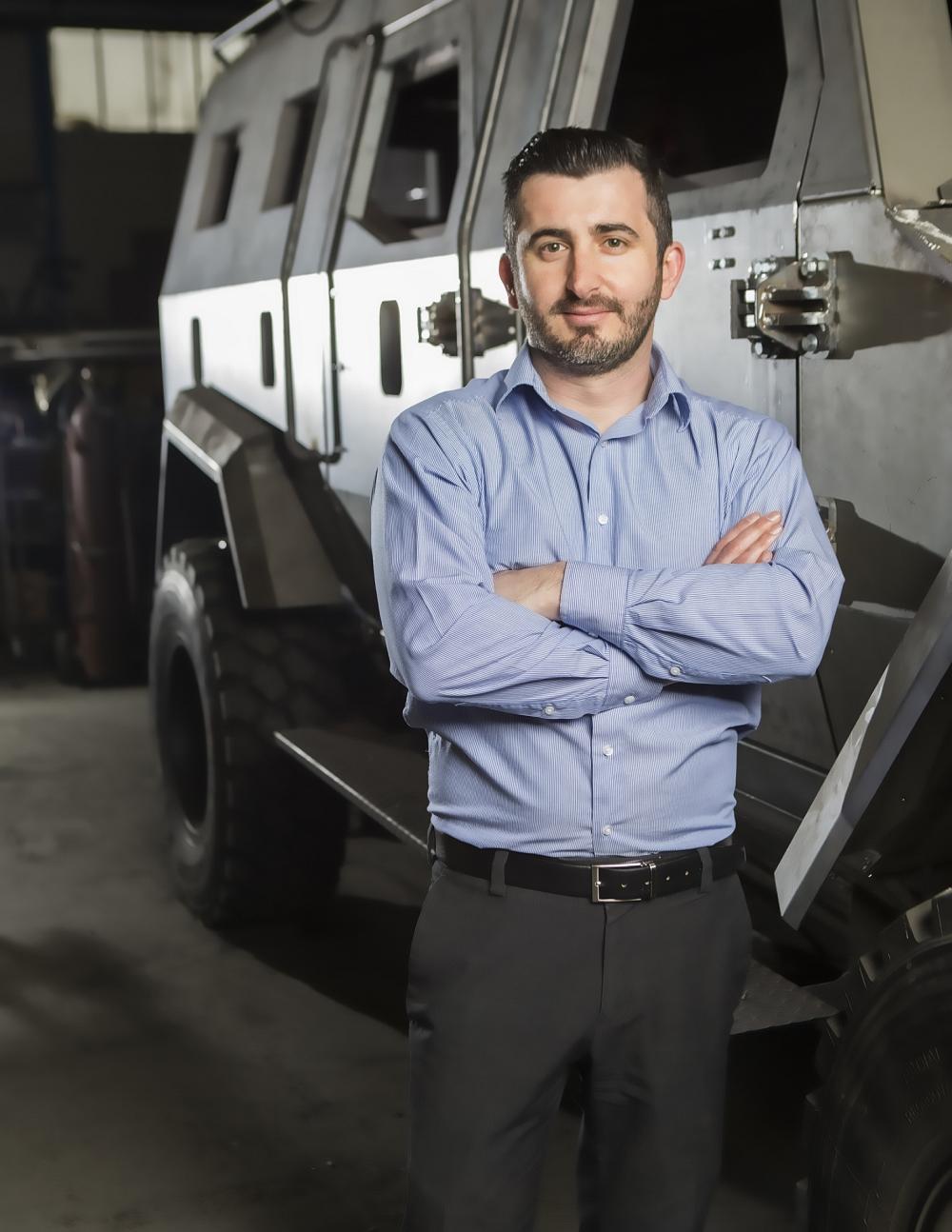
Roman Shimonov, vice president of marketing and business developments stand with one of the company's completed armored vehicles.
The company opened its Canadian facility to house its fabricating work, which had been performed in China and Dubai.
“It made sense for us to bring production in-house, rather than outsourcing it,” explained Vice President of Marketing and Business Development Roman Shimonov. “By having our own fabrication shop, we can better control the production process, the quality of parts we create, and also delivery times. Until a few years ago we outsourced the cutting, bending and all of the other fabrication work. It got to the point where we were paying hundreds of thousands of dollars a month for outsourcing. We decided to invest in our own machinery and create our own separate entity that would fabricate all of the metal parts in-house.”
Today the Metaline facility creates armored cars, custom safes, and limousines, with all metal fabrication performed in its own shop.
“The first challenge that we faced—and that we successfully overcame—was with China. Until a few years ago we manufactured most of our safes in China, as most of our competitors do,” Shimonov continued. “Quite simply, the quality was unsatisfactory. Because we are in the security business, we can’t accept poor quality. So we decided to do the manufacturing in Canada and we moved everything here. We re-created the business here, so now our safes are Canadian-made. All of the parts are made in Canada, and obviously the labor is in Canada. We are proud of that.”
The second move was to reshore the operations in Dubai.
“With the support of the government and our bank BMO, we were able to move all operations that were taking place in Dubai to Canada as well,” said Shimonov.
The company had a factory in the Emiratis city for building automotive chassis that was more cost-effective because of the cheaper labor pool, but poor quality was an issue there, too, like it was in China.
The move to Canada, along with recent investments in new technology, has solved the problems the company was having with part quality. A secondary benefit of reshoring was it also created capacity that could be used to serve outside customers in the industrial, automotive, and retail industries.
Each project starts life as raw material and is finished completely inhouse, including laser cutting, CNC bending, welding, powder coating, tube fabrication, wire forming, assembly, packaging, and delivery.
Metaline recently installed a Bystronic 4,500-W, dual-pallet, CNC fiber laser cutting machine with an automatic sheet loader capable of handling 60- by 120-in. sheets.
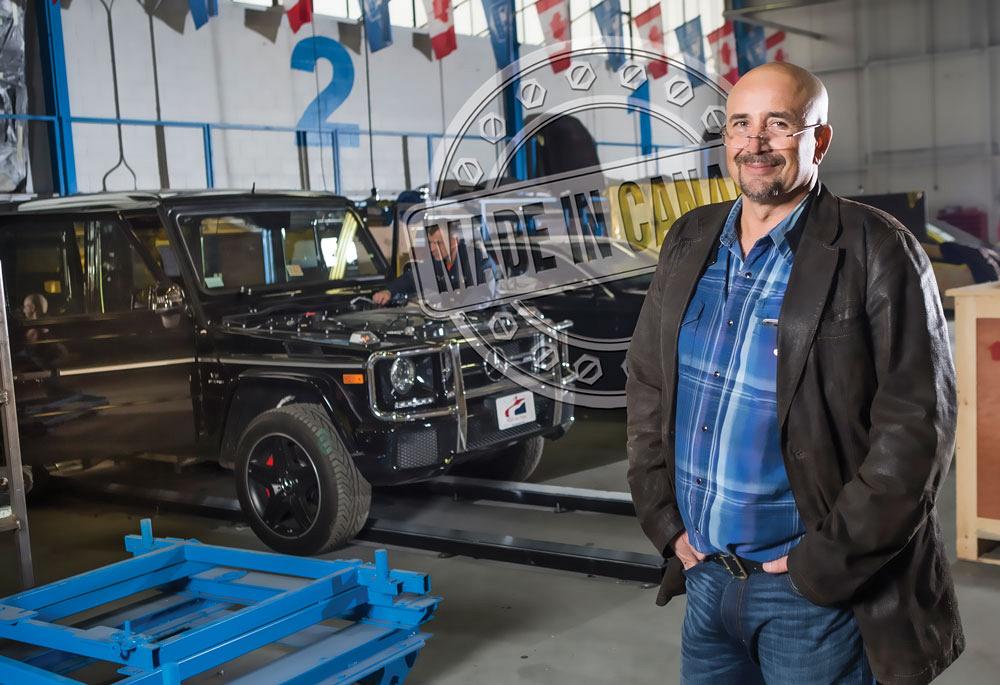
Plant Manager Sergey Maximenko stands in the company’s fabrication area as a luxury SUV is prepared.
This addition decreased the company’s cutting times while providing the precision and accuracy it needed with minimal need for operator intervention.
“The fiber laser enables us to cut almost any kind of metal, including copper, zinc, and steel,” said Shimonov.“As a result of this investment, we now have a machine that cuts faster than our current needs. It is one of the things that is allowing us to provide outsource work to other companies in bending and cutting. It will also enable us to expand when we need to.”
Every car that passes through the Metaline shop, especially the limousines and executive cars, requires different materials such as aluminum, stainless steel, and ballistic steel. The company also uses gold-plated steel in its line of luxury safes.
“We needed the flexibility to cut different materials while also getting the cut quality that we need. We had a choice when it came to how we wanted to cut and bend our parts and chose machinery that was fast, precise, and productive,” said Shimonov.
Scheduling becomes a priority when the metal fab shop produces parts for the company’s internal use as well as outside customers.
All of these reasons led to the addition of the fiber laser cutter.
“Now we have less issues with time,” said Shimonov. “By adding new cutting technology, the company can be more competitive, which helps offset the recent drop in the Canadian dollar.”
In addition to the fiber laser cutter, the company also purchased three Bystronic press brakes with tonnages of 80, 150, and 650.
“We have to bend very big parts and very thick parts,” said Shimonov. “In our area it was challenging to find a shop with a machine that we could send our parts to and keep the precision that we need. That’s why we made the investment in the large, 650-ton press brake. We have parts for military-purpose machines you simply can’t bend on the smaller press brakes, and that’s why we needed to bring in a large machine. We need to bend thick material, but also need to be very precise so parts can be welded together and assembled properly.”
The company’s 80- and 150-ton press brakes also are kept very busy. Because they are smaller and the bending cycle is much faster, parts can be processed very quickly, removing the possibility of creating a bottleneck in the bending operation.
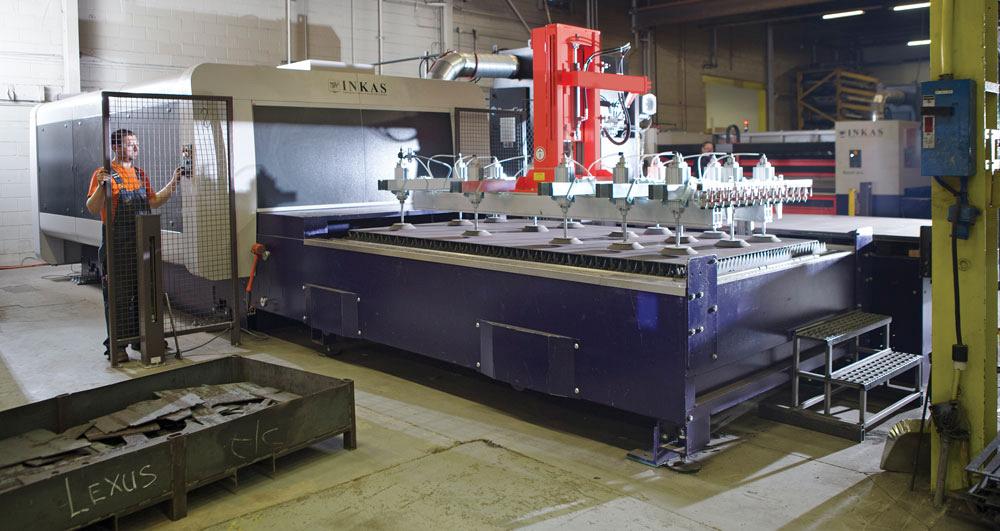
An automated CNC fiber laser cutting machine handles 60- by 120-in. sheets, creating extra capacity that the company outsources to customers in the industrial, automotive, and retail sectors.
Metaline’s certified welders play an important role in the manufacturing process, combining state-of-the-art technology with years of experience.
Engineering, R&D
It’s not just production that was a focus at Metaline; engineering and R&D also have been upgraded thanks to this new equipment. Engineering, scheduling, nesting, production, quality control, packing, and shipping have all been affected, and thanks to the move back to Canada, this work all occurs within one place.
“One of our biggest challenges is R&D,” said Shimonov. “Every time we build a new vehicle or a new safe, we have different tests to perform. Before consolidating in Canada, we were finding that we would quite often need to redo a part following our testing. When you outsource, this changeover can take a lot of time. Now we have our own machinery and our engineers can make these changes without wasting time, resources, and money.”
Quality is one of the most important factors that the company tracks. It tracks not only the quality of cutting, bending, and part production, but also the quality of services like shipping.
“It’s a big challenge to have this vertical system that starts with sales, then design and engineering, proceeds through the build, and ends in service. Doing business this way is difficult, but it allows us to design and build vehicles that the markets need,” said Shimonov. “We also can react quickly to changes that need made; changes that are told to us by our customers in the field.”
The company has a large engineering staff with separate groups focusing on the design and engineering of safes and armored vehicles, and other engineers who work solely on the products Metaline fabricates for other industries.
Metaline is even growing because of its ability to be competitive and to export its products to a worldwide market. Before the end of the year Shimonov said he hopes to hire more staff that will allow the company to grow. The company is looking for engineers with automotive experience as well as welders and fabricators.
“Being in Toronto, we have access to a lot of people from all over the world that have huge potential and experience, and we are able to give them a job because of our expansion,” said Shimonov. “We have created a huge buzz with some of our projects lately, and this is a direct result of our growth and the staff that we have been able to hire.”
The INKAS Group of Companies recently won an award from JVS Toronto for its success in hiring internationally trained professionals and integrating them into the Canadian workforce by offering language classes, mentorship opportunities, and specialized training.
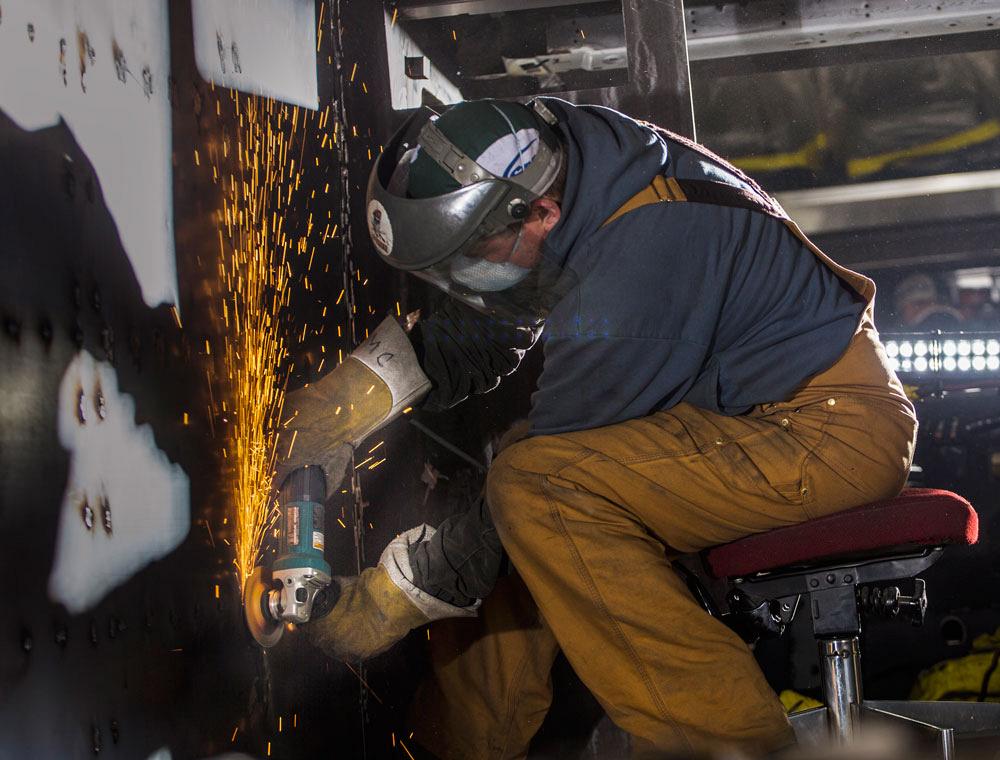
Metaline’s fabricating capability includes laser cutting, CNC bending, welding, and metal finishing.
“Being named the Leader That Best Supports Newcomers by JVS shows that it’s not only about how profitable and productive we can be, it’s about how socially active we are too,” said Shimonov. “Toronto can be a challenging place to run a manufacturing facility with its high business costs and high taxes, but we feel it’s important to be located in Toronto, right at the heart of Canadian business.”
Retired Major General Appointed COO
INKAS® Armored Vehicle Manufacturing recently appointed retired Maj. Gen. David Fraser as its new COO. Fraser also is in charge of the Metaline production facility.
Fraser is a well-known Canadian Armed Forces veteran with degrees in psychology and political science, a master’s degree in defense management and policy, as well as numerous accreditations from the Ivey Business School and the Canadian Forces College.
Fraser served for more than 30 years, leading Canadian as well as other NATO troops in Afghanistan, Bosnia, and Cyprus.
“We are thrilled to have Maj. Gen. Fraser join the family of companies,” said Shimonov. “He is a highly respected, highly decorated veteran and we are lucky to have him.”
Fraser is expected to help the company improve its position in the market, increase the quality of its products based on his experience, and expand its operation on a military level. He will also help ensure that the company’s vehicles fit the needs and requirements of peacekeeping missions on the ground.
“Fraser is an outstanding leader, and we hope he brings the military- style management practices to the business,” said Shimonov
.subscribe now


Keep up to date with the latest news, events, and technology for all things metal from our pair of monthly magazines written specifically for Canadian manufacturers!
Start Your Free Subscription- Trending Articles
- Industry Events
MME Winnipeg
- April 30, 2024
- Winnipeg, ON Canada
CTMA Economic Uncertainty: Helping You Navigate Windsor Seminar
- April 30, 2024
- Windsor, ON Canada
CTMA Economic Uncertainty: Helping You Navigate Kitchener Seminar
- May 2, 2024
- Kitchener, ON Canada
Automate 2024
- May 6 - 9, 2024
- Chicago, IL
ANCA Open House
- May 7 - 8, 2024
- Wixom, MI




